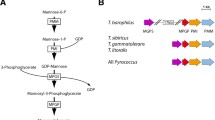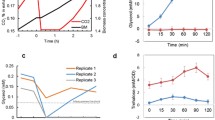Summary
Three temperature-sensitive, adenine-requiring mutants of Neurospora crassa were found to be osmotic-remedial when non-penetrating solutes were used to increase the osmolarity of the growth medium. The affected enzyme (adenylosuccinase) from one of the mutants (ad-4, 44206t) was found to have higher levels of activity when the organism was grown at non-permissive temperatures under osmotic-remedial conditions than when it was grown with adenine as a nutritional supplement. The enzyme synthesized at 30°C in the presence of adenine exhibited increased sensitivity to inhibition by high salt concentrations and a lowered stability toward heat denaturation, indicating that the remedial effect may be the result of changes in the physical properties of the enzyme molecule.
Temperature shift experiments indicate that the enzyme which is synthesized at permissive temperatures or under osmotic-remedial conditions is also stable in vivo under non-permissive conditions. This suggests that the critical period for temperature sensitivity, and conversely osmotic remediability, may be during protein synthesis or during the conformational folding of the protein.
Similar content being viewed by others
References
Bassel, J., Douglas, H. C.: Relationship between solute permeability and osmotic remediability in a galactose-negative strain of Saccharomyces cerevisiae. J. Bact. 104, 707–711 (1970)
Bilsky, A. Z., Armstrong, J. B.: Osmotic reversal of temperature sensitivity in Escherichia coli. J. Bact. 113, 76–81 (1973)
Giles, N. H., Partridge, C. W. H., Nelson, N. J.: The genetic control of adenylosuccinase in Neurospora crassa. Proc. nat. Acad. Sci. (Wash.) 43, 305–317 (1957)
Hawthorne, D. C., Friis, J.: Osmotic-remedial mutants. A new classification for nutritional mutants in yeast. Genetics 50, 829–839 (1964)
Lowry, O. H., Rosebrough, J. H., Farr, A. L., Randall, R. J.: Protein measurement with the Folin phenol reagent. J. biol. Chem. 193, 265–275 (1951)
Martin, Charles, E.: Ph. D. Dissertation. The Florida State University (1972)
Metzenberg, R. L.: Repair of multiple defects of a regulatory mutant of Neurospora by high osmotic pressure and reversion. Arch. Biochem. Biophys. 125, 532–541 (1968)
Perlman, D.: The metabolism of carbohydrates by Neurospora. Bull. Torrey Bot. Club 77, 103–109 (1950)
Russell, R. R. B.: Temperature-sensitive osmotic remedial mutants of Escherichia coli. J. Bact. 112, 661–665 (1972)
Vogel, H. J.: Distribution of lysine pathways among fungi: Evolutionary implications. Amer. Naturalist 98, 435–446 (1964)
Author information
Authors and Affiliations
Additional information
Communicated by R. Devoret
Rights and permissions
About this article
Cite this article
Martin, C.E., DeBusk, A.G. Temperature-sensitive, osmotic-remedial mutants of Neurospora crassa: Osmotic pressure induced alterations of enzyme stability. Molec. Gen. Genet. 136, 31–40 (1975). https://doi.org/10.1007/BF00275446
Received:
Issue Date:
DOI: https://doi.org/10.1007/BF00275446




